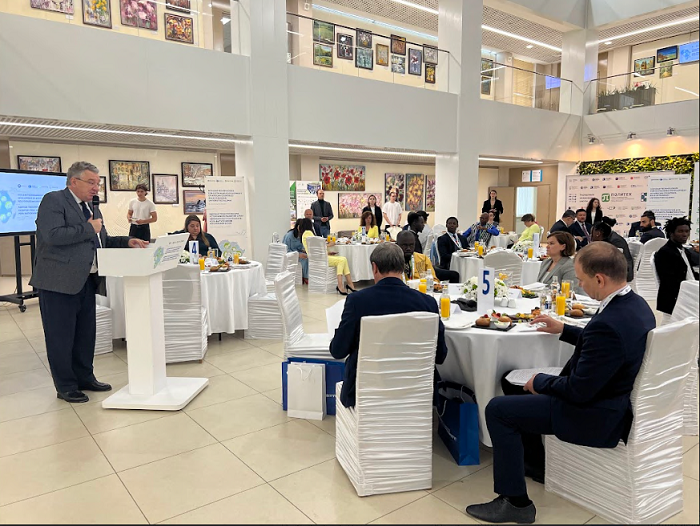On July 28, a round table “Nuclear technologies for sustainable development of the African countries : the role of the Russian and Soviet universities’ Alumni” was held on the basis of Peter the Great St. Petersburg Polytechnic University in the format of a business breakfast. The event took place within the framework of the Second summit and humanitarian forum “Russia — Africa”. It was organized with the support of the Rosatom State Corporation and the Peoples’ Friendship University named after Patrice Lumumba.

Over 50 people participated in the business breakfast, including Konstantin Mogilevsky, Deputy Minister of Science and Higher Education, Pavel Shevtsov, Deputy Head of Rossotrudnichestvo, Valery Karezin, Director of the Educational Projects of Rosatom State Corporation, a delegation of the Egyptian Nuclear Power Plant Authority headed by Director Dr. Amged El-Wakeel, Fidele Ndahayo, Director General of the Atomic Energy Commission of Rwanda, Jean Albert Manigomba, Director General of the State Electric Company, and representatives of the Atomic Energy Commissions of Ghana and Nigeria, heads of Alumni associations of the Russian (Soviet) universities and internaitonal students and graduates from 10 African countries, as well as representatives of Russian partner universities of Rosatom State Corporation.
During the event, the participants exchanged opinions on the possible expansion of Russia’s partnership with African countries through the interaction of “university – graduate – industry” both in the field of education and in energy, medicine, agriculture and other areas to solve socio-economic problems .
In his welcoming speech Konstantin Mogilevsky noted the importance of cooperation in the field of education with African countries, including within the framework of the Russia-Africa Network University. “Energy independence is an important part of national sovereignty”, he stressed. “In the field of nuclear energy, Russia is a reliable partner for foreign friends and an absolute leader in the construction of nuclear power units. Rosatom State Corporation is one of the key partners of the Ministry of Science and Higher EDucation. To achieve the goals set by nuclear scientists on the international track in the coming years, the industry will need thousands and thousands of specialists, both in Russia and Africa, as well as where they understand the efficiency and safety of nuclear energy. And I think that all international students who are studying now will find a job either here or in their homecountries”.
In turn, Valery Karezin, Director of Educational Programs at ROSATOM, stressed the importance of graduates being employed in their countries after completing their studies in Russia.”Next year we are celebrating the 70th anniversary of the first nuclear power plant. Over these 70 years, we have accumulated a unique knowledge base”, said Valery Karezin. “And we consider it our duty to share this knowledge with our partners. Cooperation with universities abroad is the most important priority for Rosatom. It is very important for us that graduates get employed. The personnel training system has no inventory. After all, if they don’t find a job, they go to another industry, and we lose them. Therefore, we will have to work so that our graduates find their place in life”.
Foreign speakers noted the significant role of the Russian universities’ Alumni in all sectors of the economy of their countries, as well as that the high level of education received in the Russian Federation is a serious advantage in finding employment in African countries. A member of the Ghana Atomic Energy Commission Paul Amoah, a graduate of Tomsk Polytechnic University, noted “Thanks to the program I studied at and to the opportunity to get practical experience further and develop my professional skills within the Ghana Atomic Energy Commission I have got the experience and confidence in the knowledge I gained, which I can apply in the areas where we work further in our country”.
In addition, interaction with foreign graduates of Russian and Soviet universities who have received education in the field of nuclear and related technologies contributes not only to the popularization of the Russian education, but also to an increase in interest in nuclear “green” technologies.
Leave a Reply